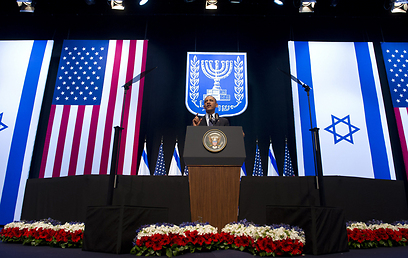
As far as the US is concerned, Israelis who were born in Jerusalem belong to no country
צילום: gettyimages
America's hypocritical lip service on Jerusalem
Op-ed: Why is the US refusing to recognize Jerusalem as Israel's capital, but is willing to swallow other bitter pills like Israel's settlement and annexation policy?
There is something strange in the Americans' refusal to recognize Jerusalem as Israel's capital, a policy which got the approval of the Supreme Court of the United States on Monday.

The court ruling, which does not relate to the case in question but only to the question who has the authority to set a policy on such issues (the president), raised awareness to this ridiculous issue, the traditional insistence of the US not to swallow this particular bitter pill – Jerusalem's status as Israel's capital – while it willingly swallows other bitter pills.
As far as the US is concerned, Israelis who were born in Jerusalem, both in its western side and in its eastern side, are not part of the State of Israel, but are floating in the air. They are residents of a city which doesn't belong, at least for now, to any country.
All this goes back to the Partition Plan, which determined that Jerusalem would be under an international regime led by a governor who would be appointed by the United Nations. Since then, not much remained from the Partition Plan. Gradually, most countries of the world recognized the 1949 armistice lines, although they were entirely different from the partition's outline and although they were not determined through an agreement, but through war. Jerusalem remained a sort of self-righteous footnote to that plan, which became outdated some time ago.

US President Obama in Jerusalem in 2013. In practice, US recognizes Jerusalem's status in every matter of importance (Photo: AFP) (צילום: AFP)
In practice, despite the American Embassy's location in Tel Aviv and the pious registration in the passport, the US recognizes Jerusalem's status in every matter of importance. Its official representatives, including the president, do not keep away from the city. On the contrary, they visit Jerusalem quite a lot, as guests of the Knesset and as guests of the Israeli government.
The failure to recognize Jerusalem as Israel's capital is a sort of weird sacrifice to the god of some imaginary political correctness and an attempt to please the Palestinians with an issue which makes no difference.
In general, it should be noted, the US does not perceive international relations as recognizing everything the other side does. In Saudi Arabia, for example, there is slavery, at least in practice if not theoretically, and it has different forms of violations of human rights, which are definitely a thorn in the US's side. That hasn't stopped the Americans from maintaining proper diplomatic relations with Saudi Arabia, "until the human rights issues there are settled."
Diplomacy deals with the world as it is, not with the desirable world. That doesn’t mean that one doesn’t have to aspire to fix the world. Things are dynamic. It only means that diplomacy also exists in a world which requires a repair.
Israel enjoys this diplomatic perception quite often. The US avoids, for example, imposing any sanctions on the State of Israel over its settlement policy in the territories, although it believes, at least theoretically, that Israel is seriously violating international law. In fact, the US administrations have not placed any obstacles in the path of the Israeli annexation policy. Even when Israel violates official commitments to the Americans, for example evacuating illegal outposts, the US swallows the bitter pill and settles for a refined frown and vague hints about some hidden price that Israel might be forced to pay in the distant future.
The annoying thing, therefore, in the US's Jerusalem policy is the fact that it is merely hypocritical lip service. If the US really wanted to advance an agreement between Israel and the Palestinians, it could have done so in 1,001 different ways. It isn't interested in doing so for several reasons: It isn't sure that an agreement is possible, and it mainly doesn’t see such an agreement as an important American interest.
From a political perspective, a firm US peace policy which the Israeli annexation governments do not accept will evoke a lot of criticism against the administration, criticism it has no (political) interest in dealing with, just like it has no interest in quarreling with Prime Minister Benjamin Netanyahu, despite his many spits in its face. That's the way it is.
In a better world, the US would recognize Jerusalem – or at least its western part – as the capital of the State of Israel, while firmly advancing a process towards an agreement. In this word, the US supports annexation and is strict about what is written in passports.










